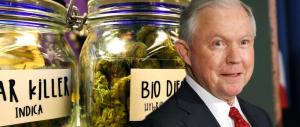How badly is the Trump-Sessions’ ‘War on Marijuana’ backfiring? This badly…
 It turns out January 2018 was the biggest month yet for marijuana legalization:
It turns out January 2018 was the biggest month yet for marijuana legalization:
California at the beginning of the month opened the world’s biggest legal market for recreational marijuana — following voters’ decision in 2016 to legalize pot for recreational purposes and allow sales of the drug.
Then, after Sessions announced his new marijuana policy, Vermont legislators, with the support of Republican Gov. Phil Scott, legalized marijuana for recreational use. The law won’t allow sales — only possession and growing. But it’s a big move because Vermont is now the first state to have legalized marijuana through its legislature.
…
Earlier this month, Sessions announced that he was rescinding an Obama-era memo that effectively told states that they can move forward with marijuana legalization without the threat of federal interference. … The vagueness of Sessions’s new guidance, though, left it up to individual prosecutors to decide whether they will take action against legal pot states. By and large, federal prosecutors seem to have responded with a shrug.
Donald Trump has let Sessions off the leash with regard to the dying “war on pot,” no doubt because marijuana is linked to those unsightly brown people in the minds of white MAGA America. On the other hand, many libertarian-leaning Trump supporters are butthurt by Uncle Dotard Adminitration policy on pot:
“Trump needs to realize that a lot of his supporters are pro-cannabis and it would be extremely hurtful to them if he allowed Sessions to move forward with this,” said Damara Kelso, a Trump voter who runs Sugar Shack Farms, a marijuana grower in Eugene, Oregon. “It’s not lazy pothead stoners smoking weed all day in their parents’ basement.”
…
Republicans who felt Trump would be a pro-marijuana president were misguided, said Jeffrey Miron, a Harvard University economist who studies the economics of libertarianism with a focus on illegal drugs.
Weed-loving Trump fans might be experiencing buyer’s remorse, but it’s too early to say whether that could make a difference at the voting polls, Miron said.
“Libertarians certainly knew when he appointed Jeff Sessions that there was a serious risk in an escalation of the war on drugs,” he said. “I think you get what you pay for.”
There is some good news for both Trump’s pro-marijuana deplorables and detractors: Sessions’s 1930s-style campaign to crack down on the “evil weed” has backfired; he made a major miscalculation that is fueling campaigns for legalization at the state and federal level.
Sessions instructed all United States attorneys to treat cannabis-related activities like any suspected crime, instead of making them a low priority if they comply with state laws. … [Sessions’s move] may have actually accelerated the process toward federal marijuana legalization.
…
[A] Pew Research Center poll conducted in October found that 61 percent of Americans supported legalization – up from 57 percent a year earlier and nearly double the backing for legal pot in 2000. For the first time, Gallup polling determined, a majority of Republicans support legalization.
…
The way state lawmakers, attorneys general, industry participants and other stakeholders reacted to even [Sessions’s] small gesture demonstrated something that Sessions seems to have failed to consider – that the coalition in support of marijuana legalization had grown considerably.
State lawmakers in California, Colorado, Massachusetts and other states, and even some of the Republicans in Congress, objected. A group of 54 House and Senate Democrats sent Trump a letter urging him to reverse course.
“This action has the potential to unravel efforts to build sensible drug policies that encourage economic development as we are finally moving away from antiquated practices that have hurt disadvantaged communities,” they wrote.
State attorneys general, who do not report to Sessions, such as those serving in Colorado, Washington, Pennsylvania and Michigan, have shown no interest in modifying their current practices.
And 19 of them urged Congress to change banking laws so that marijuana businesses in their states would no longer have to rely solely on cash to handle billions of dollars in legal pot transactions. That way, they wrote, their revenue could be fully tracked, aiding taxation and limiting criminal activity that targets cash-intensive businesses.
All in all, the fierce reaction across the political spectrum reaction shows two things: Sessions’ memo is an empty threat and pot’s days as an illegal drug are numbered.
Now, that likely won’t stop Sessions’s chronic calls for a crackdown, but it’s clear he is in a losing, money-wasting fight.
